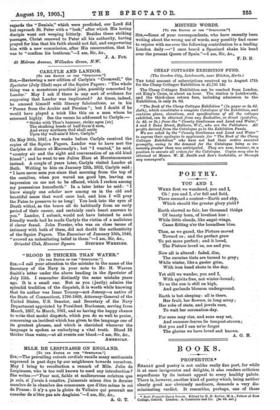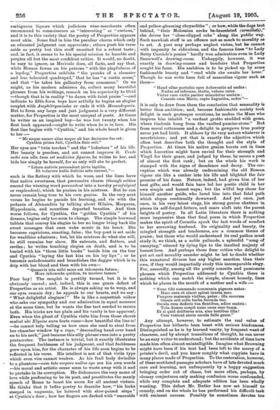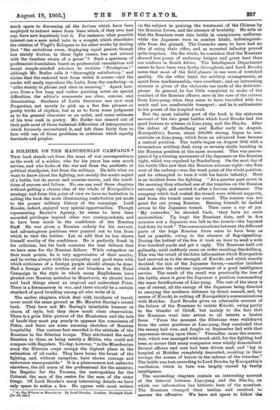REALLY good poetry is not unlike really fine port, for
while it at once invigorates and delights, it also renders criticism superfluous by its instant appeal to every healthy palate. There is, however, another kind of poetry which, being neither clearly good nor obviously mediocre, demands a very dis- criminating verdict. It resembles, perhaps, one of those • Sea-fi Properti Opera Omnia. Edited by H. E. Butler, M.A., Fellow of New College, Oxford. London : A. Constable and Co. [Si. 6d. net. J
ambiguous liquors which judicious wine-merchants often recommend to connoisseurs as " interesting " or "curious," and it is to this variety that the poetry of Propertius appears most akin. Some find in him the peculiar charm which only an educated judgment can appreciate ; others push his verse aside as pretty but thin stuff unsuited for a robust taste ; and, in fact, it seems to be his special mission to humble and perplex all but the most confident critics. It would, no doubt, be easy to ignore, as Merivale does, all facts, and say that, while Horace fawns on his patrons "with the playfulness of a lapdog," Propertius exhibits "the pranks of a clumsier and less tolerated quadruped," that he has "a rustic muse," and that "he takes his gallantry from romances." Or we might, as his modern admirers do, collect many beautiful phrases from his writings, remark on his superiority to Ovid —though that is in reality "to damn with faint praise "—and indicate to fifth-form boys how artfully he begins an elegiac couplet with AmPhitryoniades or ends it with Hamadrgasin. But to form any large and just judgment is a very different matter, for Propertius is the most unequal of poets. At times he writes as an inspired boy—he was but twenty when his first book appeared—ought to write when be is in love. His first line begins with "Cynthia," and his whole heart is given to her :— " Mi neque amare alias neque ab hac deciscere fas est : Cynthia prima fait, Cynthia finis erit."
Her eyes are "twin torches" and the " lodestars " of his life.
Her beauty is peerless, and art cannot improve it. Crede mihi non ulla tuae est medicina figurae, he writes to her, and bids her simply be herself, for so only will she be perfect.
"Litora nativis persuadent pieta lapillis,
Et volucres nulls dulcius arte canunt,"—
such is the flattery with which be woos, and the lines have that native sweetness, that persuasive charm (though critics emend the winning word persuade at into a tawdry praefulgent or resplendent), which he praises in his mistress. But he can never remain long true to his own genius. In the very next verses he begins to parade his learning, and vie with the pedants of Alexandria by talking about Hilaira, Marpessa, Hippodamia, and countless departed beauties. And then worse follows, for Cynthia, the "golden Cynthia" of his dreams, begins only too soon to change. The simple boxwood tablets that convey his elegies to her no longer bring back the sweet messages that once woke music in his heart. She becomes capricious, exacting, false ; the boy-poet is set aside for wealthier admirers ; but, let his mistress do what she will, he still remains her slave. He entreats, and flatters, and reviles ; he writes touching elegies on death, and is to be buried with his "three little books" beside him on the bier and Cynthia "laying the last kiss on his icy lips " ; or he becomes melodramatic and brandishes the dagger which is to drip with her blood and then with his own- " Quamvis ista mihi mors est inhonesta Mors inhonesta quidem, tu moriere tamen."
Poor boy ! The couplet is prettily turned, but it is too obviously unreal ; and, indeed, this is one grave defect of Propertius as an artist. He is always asking us to weep, and our eyes remain dry ; he appeals to our hearts, and we say : "What delightful elegiacs!" He is like a coquettish widow who asks our sympathy and our admiration in equal measure at the same time, but he wants the fine tact needed to secure both. His tricks are too plain and his vanity is too apparent. Even when the ghost of Cynthia visits him from those shore's muleet ubi Elysias aura beata rosas—how beautiful the line is! —he cannot help telling us how once she used to steal from her chamber window by a rope, "descending hand over hand on to his neck," just because this silly phrase runs into a pretty pentameter. The instance is trivial, but it exactly illustrates the frequent feebleness of his judgment, and that feebleness grew upon him, for the character of his life soon begins to be reflected in his verse. His intellect is not of that virile type which even vice cannot weaken. As his frail body dwindle's to a phantom—sum toto corpore nullus ego are his own words —his moral and artistic sense seem to waste away with it and to partake in its corruption. He dishonours the very name of love while professing to be its poet, and prostitutes the manly speech of Rome to boast his scorn for all ancient virtues. He thinks that it befits poetry to describe how, "his locks steeped in unguents, he loitered with slow-poised steps" at Cynthia's door ; how her fingers are decked with "emeralds and yellow-gleaming cbrysoliths " ; or how, while the dogs trot behind, "their Molossian necks be-braceleted armillati )," she drives her "close-chipped cobs" along .the public way. Such mawkish stuff is an offence not so much to morality as to art. A poet may perhaps neglect virtue, but he cannot with impunity be ridiculous, and the famous lines " to Lady Betty Curricle's ponies" hardly won admiration even in Lady Sneerwell's drawing-room. Unhappily, however, it was exactly in drawing-rooms and boudoirs that Propertius
sought his fame. His ambition is to be picked up by some fashionable beauty and "read while she awaits her lover?' Though he can write lines full of masculine vigour such as these- " Hand ullas portabis opes Acherontis ad undas Nuclus ad infernas, stulte, vehere rates. Victor cum victis pariter miscebitur umbris : Consule cum Mario, capte Iugurtha, sedes"— it is only to draw from them the conclusion that sensuality is better than ambition; and, because fashionable society took delight in such grotesque creations, he makes the Muse who inspires him inhabit "a verdant grotto studded with gems, where timbrels bang from the vaulted pumice-stone." But from moral rottenness and a delight in gewgaws true poetry never yet had birth. It abhors by its very nature whatever is meretricious ; and yet that is exactly the adjective which often best describes both the thought and the style of Propertius. At times his native genius bursts out in lines which Lucretius might have envied for their strength and
Virgil for their grace, and judged by these, he seems a poet of almost the first rank ; but on the whole his work is stamped with the signs of decadence and decay. The cor- ruption which was already undermining the old Roman vigour ate like a canker into his life and blighted the fair promise of his fame. Nature, indeed, bad given him of her best gifts, and would fain have led her poetic child in her own simple and honest ways ; but the wilful boy chose for himself another guide, who lured him into that fatal path which slopes continually downward. And yet once, just once, in his very latest elegy, his strong genius shatters in pieces its self-forged fetters, and soars aloft into the purest heights of poetry. In all Latin literature there is nothing more impressive than that final poem in which Propertius makes the spirit of Cornelia speak the last words of comfort to her sorrowing husband. Its originality and beauty, its mingled strength and tenderness, are a common theme of praise; but those who would understand its real pathos must study it, we think, as a noble palinode, a splendid "song of unsaying," uttered by dying lips to the insulted Majesty of honest love. And perhaps those finer critics who delight to put art and morality asunder might be led to doubt whether this unnatural divorce has any higher sanction than their own, if they would impartially study this incomparable elegy. For, assuredly, among all the pretty conceits and passionate phrases which Propertius addressed to Cynthia there is nothing which can match the simple, almost homely, lines which he places in the mouth of a mother and a wife :—
" Nunc tibi commend° communia pignora natos: Haec curs et cineri spirat musts meo.
Fungere maternis vicibus, pater : ills meorum Onmis erit cello turba ferenda tuo.
Oscula cum dederis tun fientibus, adios matris
Tota domus coepit nun° onus ease tuum. Et Bi quid doliturus ens, sine testibus illis !
Cum venient siccis oscula falle genis."
Any attempt, however, to estimate the real value of Propertius has hitherto been beset with serious hindrances. Distinguished as he is by learned vanity, by frequent want of clearness, and by abrupt transitions of thought, he can never be an easy writer to understand ; but the accidents of time have made him often almost unintelligible. Imagine what Browning might have been if his text had been left to the mercy of a printer's devil, and you know roughly what copyists have in many places made of Propertius. To the restoration, however, of these mutilated passages scholars have of late devoted much care and learning, not unfrequently by a happy suggestion bringing order out of chaos, but more often, perhaps, by clumsy conjectures only making confusion worse confounded, while any complete and adequate edition has been wholly wanting. This defect Mr. Butler has now set himself to remedy, and on the whole he has performed his difficult task with eminent success. Possibly he sometimes devotes too much space to discussing all the devices which have been employed to extract sense from lines which, if they ever had any, have now hopelessly lost it. For instance, what possible interest can a sane mind take in a couplet which elucidates the relation of Virgil's Eclogues to his other works by stating that "the melodious swan, displaying equal genius, though less stately diction, in these light verses, has not retired with the tuneless strain of a goose" ? Such a specimen of professorial translation based on professorial emendation will tempt simple-minded scholars to exclaim " Prodigious !" although Mr. Butler calls it "thoroughly satisfactory," and claims that the restored text from which it comes—and the reader will easily reproduce the Latin from the rendering—is "alike stately in phrase and clear in meaning." Apart, how- ever, from a few long and rather puzzling notes on special difficulties, the editor's comments are clear, concise, and illuminating. Students of Latin literature can now read Propertius, not merely to pick up a few fine phrases or pretty tricks of rhythm, but so as to form some judgment as to his general character as an artist, and some estimate of his true rank in poetry. Mr. Butler has cleared out of their path most of those technical difficulties of interpretation which formerly encumbered it, and left them fairly face to face with one of those problems in criticism which equally fascinate and perplex.




































 Previous page
Previous page